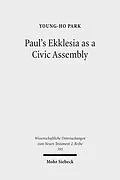The Greek word ekklesia originally meant the civic assembly of all citizens in the classical Greek democracy. Young-Ho Park argues that the strong civic connotation of this term continued to operate in the political culture of the Hellenistic and Roman periods. The use of ekklesia in second-temple Judaism should also be understood as part of this political culture in which the Jews were substantially incorporated. By adopting this civic term in his letters to his local Gentile congregations, Paul effectively created a symbolic universe in which the Christ worshippers saw themselves as the honorable citizens who represented the city before God. This civic nature of the community was also used as Paul's solution to the Corinthian problem, especially with regard to the Lord's Supper, and provided an organizational principle for the local communities.
Born 1965; BA at Pusan National University; M. Div. and Th. M. at Presbyterian Theological Seminary, Seoul; STM at Yale Divinity School; 2012 PhD at University of Chicago; Professor of New Testament at Hanil University and Theological Seminary in Korea.
Autorentext
Born 1965; BA at Pusan National University; M. Div. and Th. M. at Presbyterian Theological Seminary, Seoul; STM at Yale Divinity School; 2012 PhD at University of Chicago; Professor of New Testament at Hanil University and Theological Seminary in Korea.
Autorentext
Born 1965; BA at Pusan National University; M. Div. and Th. M. at Presbyterian Theological Seminary, Seoul; STM at Yale Divinity School; 2012 PhD at University of Chicago; Professor of New Testament at Hanil University and Theological Seminary in Korea.
Titel
Paul's Ekklesia as a Civic Assembly
Untertitel
Understanding the People of God in their Politico-Social World
Autor
EAN
9783161532566
ISBN
978-3-16-153256-6
Format
E-Book (pdf)
Hersteller
Herausgeber
Digitaler Kopierschutz
Adobe-DRM
Dateigrösse
2.05 MB
Anzahl Seiten
264
Jahr
2015
Untertitel
Englisch
Unerwartete Verzögerung
Ups, ein Fehler ist aufgetreten. Bitte versuchen Sie es später noch einmal.
